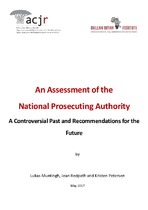An Assessment of the National Prosecuting Authority: A Controversial Past and Recommendations for the Future
Abstract
The Constitution of South Africa provides for a single, independent national prosecution authority. The office of the National Prosecuting Authority (NPA) was formally established through the National Prosecuting Authority Act on 1 August 1998, replacing the former provincial Attorneys-General. The Constitution provides that the NPA has the power to institute and conduct criminal proceedings on behalf of the state; carry out any necessary functions incidental to instituting and conducting such criminal proceedings, and discontinue criminal proceedings.
Twenty years into democracy, the independence of the NPA, in particular the National Director of Public Prosecutions (NDPP), has become a highly contested and politicised issue. The Constitutional Court has noted that ‘[t]he constitutional obligation upon the State to prosecute those offences which threaten or infringe the rights of citizens is of central importance in our constitutional framework’.
This report focuses on the substantive problems and dilemmas facing the NPA. In the discussion that follows the major challenges that the NPA is facing and have faced are set out. The report unpacks these and presents possible solutions and recommendations.
The first issue dealt with is the independence of the NPA and NDPP as it relates to the dismissal and appointment of the NDPP and it is argues that the process lacks transparency. Moreover, the lack of a transparent selection and appointment process has raised concerns about the ‘fit and proper’ requirement for the position of NDPP and other senior positions in the NPA. Interference by the executive in the work of the NPA has also emerged as a concern.
The second issue dealt with is the accountability of the NPA and NDPP with reference to general proceedings and decisions to prosecute or not. Accountability is also examined in the light of the Prosecution Policy and Prosecution Directives.
Thirdly, the question is raised whether the NPA is effective in holding offenders accountable. Data is presented that the institution’s performance is on a steady decline in pursuit of a high conviction rate, raising question about efficiency and effectiveness.

